SH5054QA Report: Mental Health Challenges of Healthcare Workers
VerifiedAdded on 2023/06/05
|19
|3470
|155
Report
AI Summary
This report summarizes the mental health challenges faced by healthcare workers during the COVID-19 pandemic, including the adverse impact on their mental stability due to immense pressure and stress. It reflects on a small group presentation using the CASP framework for critiquing an academic paper, highlighting its usefulness in analyzing the article's aspects and determining key factors. The report also provides a detailed critique of the academic paper using the CASP tool, focusing on the systematic review of healthcare workers' mental health during the pandemic, addressing the study's limitations, and evaluating the methodology and results.
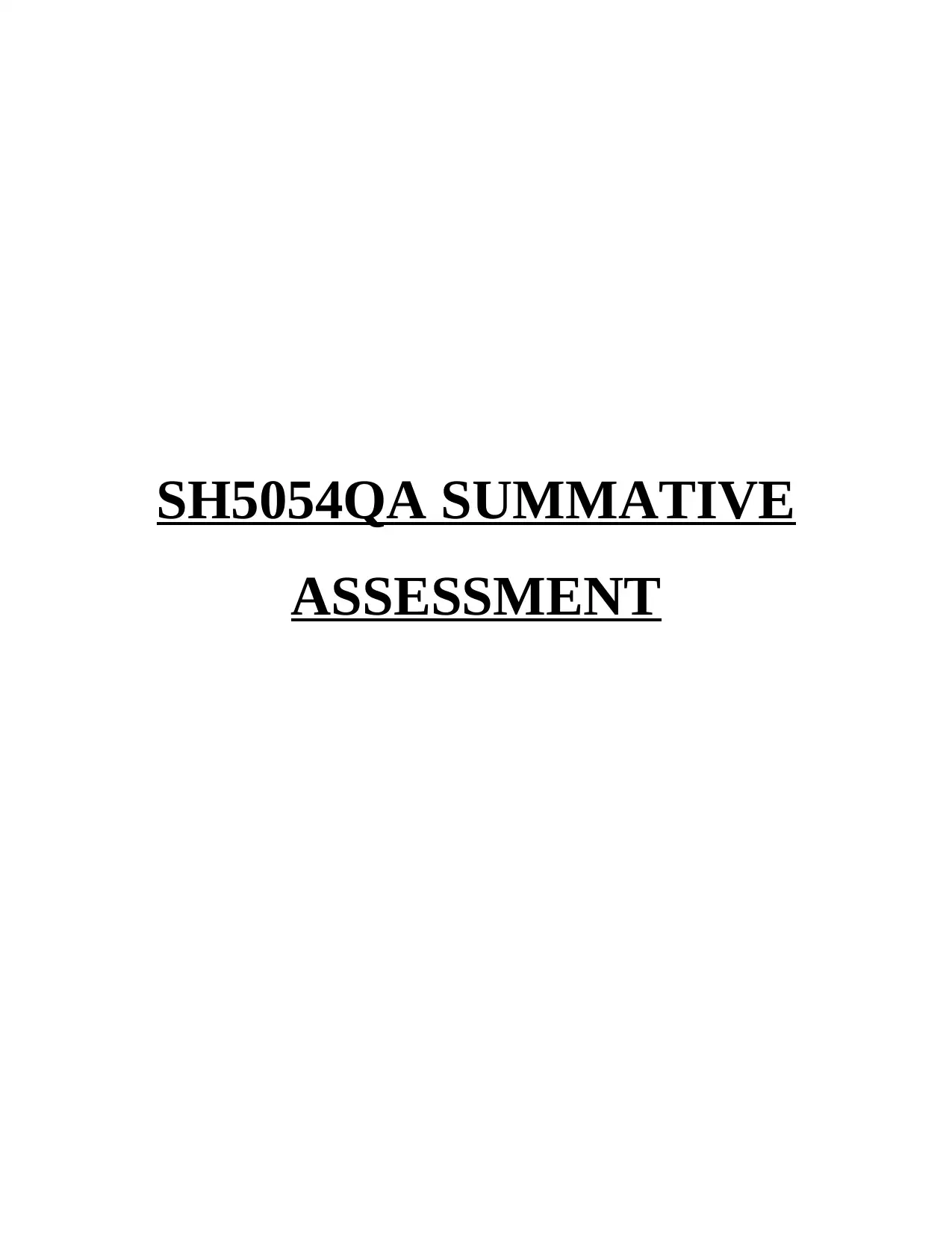
SH5054QA SUMMATIVE
ASSESSMENT
ASSESSMENT
Paraphrase This Document
Need a fresh take? Get an instant paraphrase of this document with our AI Paraphraser
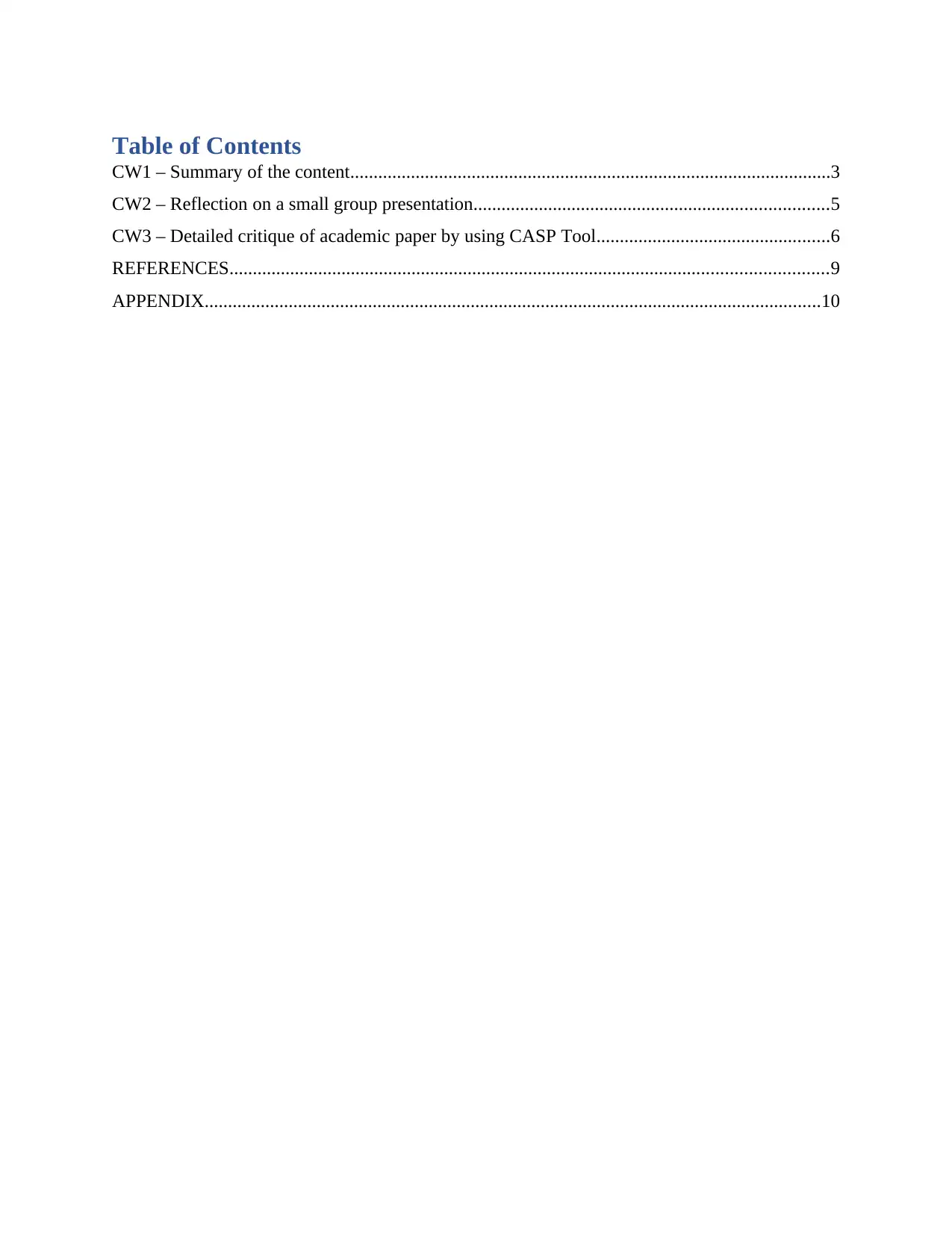
Table of Contents
CW1 – Summary of the content.......................................................................................................3
CW2 – Reflection on a small group presentation............................................................................5
CW3 – Detailed critique of academic paper by using CASP Tool..................................................6
REFERENCES................................................................................................................................9
APPENDIX....................................................................................................................................10
CW1 – Summary of the content.......................................................................................................3
CW2 – Reflection on a small group presentation............................................................................5
CW3 – Detailed critique of academic paper by using CASP Tool..................................................6
REFERENCES................................................................................................................................9
APPENDIX....................................................................................................................................10
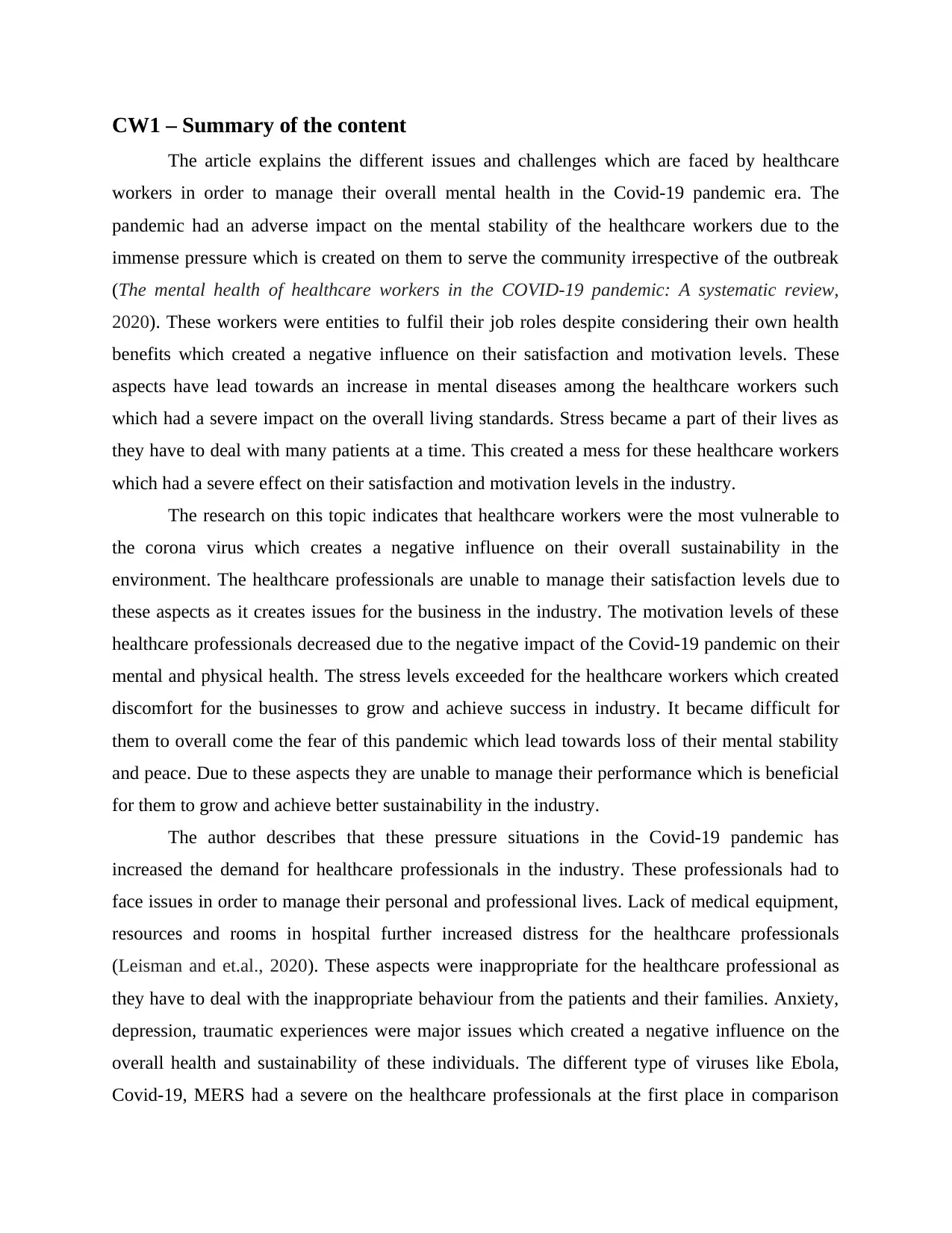
CW1 – Summary of the content
The article explains the different issues and challenges which are faced by healthcare
workers in order to manage their overall mental health in the Covid-19 pandemic era. The
pandemic had an adverse impact on the mental stability of the healthcare workers due to the
immense pressure which is created on them to serve the community irrespective of the outbreak
(The mental health of healthcare workers in the COVID-19 pandemic: A systematic review,
2020). These workers were entities to fulfil their job roles despite considering their own health
benefits which created a negative influence on their satisfaction and motivation levels. These
aspects have lead towards an increase in mental diseases among the healthcare workers such
which had a severe impact on the overall living standards. Stress became a part of their lives as
they have to deal with many patients at a time. This created a mess for these healthcare workers
which had a severe effect on their satisfaction and motivation levels in the industry.
The research on this topic indicates that healthcare workers were the most vulnerable to
the corona virus which creates a negative influence on their overall sustainability in the
environment. The healthcare professionals are unable to manage their satisfaction levels due to
these aspects as it creates issues for the business in the industry. The motivation levels of these
healthcare professionals decreased due to the negative impact of the Covid-19 pandemic on their
mental and physical health. The stress levels exceeded for the healthcare workers which created
discomfort for the businesses to grow and achieve success in industry. It became difficult for
them to overall come the fear of this pandemic which lead towards loss of their mental stability
and peace. Due to these aspects they are unable to manage their performance which is beneficial
for them to grow and achieve better sustainability in the industry.
The author describes that these pressure situations in the Covid-19 pandemic has
increased the demand for healthcare professionals in the industry. These professionals had to
face issues in order to manage their personal and professional lives. Lack of medical equipment,
resources and rooms in hospital further increased distress for the healthcare professionals
(Leisman and et.al., 2020). These aspects were inappropriate for the healthcare professional as
they have to deal with the inappropriate behaviour from the patients and their families. Anxiety,
depression, traumatic experiences were major issues which created a negative influence on the
overall health and sustainability of these individuals. The different type of viruses like Ebola,
Covid-19, MERS had a severe on the healthcare professionals at the first place in comparison
The article explains the different issues and challenges which are faced by healthcare
workers in order to manage their overall mental health in the Covid-19 pandemic era. The
pandemic had an adverse impact on the mental stability of the healthcare workers due to the
immense pressure which is created on them to serve the community irrespective of the outbreak
(The mental health of healthcare workers in the COVID-19 pandemic: A systematic review,
2020). These workers were entities to fulfil their job roles despite considering their own health
benefits which created a negative influence on their satisfaction and motivation levels. These
aspects have lead towards an increase in mental diseases among the healthcare workers such
which had a severe impact on the overall living standards. Stress became a part of their lives as
they have to deal with many patients at a time. This created a mess for these healthcare workers
which had a severe effect on their satisfaction and motivation levels in the industry.
The research on this topic indicates that healthcare workers were the most vulnerable to
the corona virus which creates a negative influence on their overall sustainability in the
environment. The healthcare professionals are unable to manage their satisfaction levels due to
these aspects as it creates issues for the business in the industry. The motivation levels of these
healthcare professionals decreased due to the negative impact of the Covid-19 pandemic on their
mental and physical health. The stress levels exceeded for the healthcare workers which created
discomfort for the businesses to grow and achieve success in industry. It became difficult for
them to overall come the fear of this pandemic which lead towards loss of their mental stability
and peace. Due to these aspects they are unable to manage their performance which is beneficial
for them to grow and achieve better sustainability in the industry.
The author describes that these pressure situations in the Covid-19 pandemic has
increased the demand for healthcare professionals in the industry. These professionals had to
face issues in order to manage their personal and professional lives. Lack of medical equipment,
resources and rooms in hospital further increased distress for the healthcare professionals
(Leisman and et.al., 2020). These aspects were inappropriate for the healthcare professional as
they have to deal with the inappropriate behaviour from the patients and their families. Anxiety,
depression, traumatic experiences were major issues which created a negative influence on the
overall health and sustainability of these individuals. The different type of viruses like Ebola,
Covid-19, MERS had a severe on the healthcare professionals at the first place in comparison
⊘ This is a preview!⊘
Do you want full access?
Subscribe today to unlock all pages.

Trusted by 1+ million students worldwide
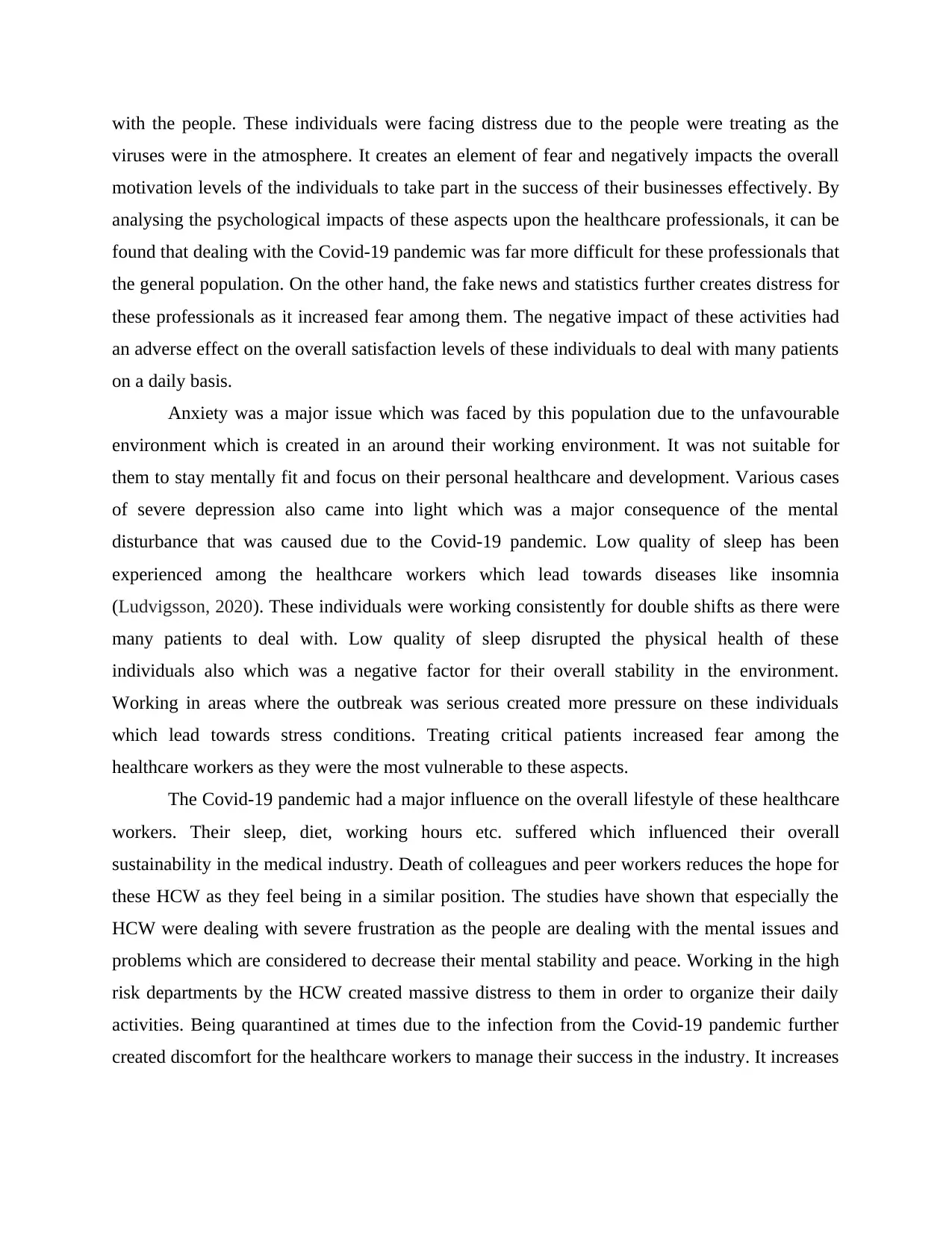
with the people. These individuals were facing distress due to the people were treating as the
viruses were in the atmosphere. It creates an element of fear and negatively impacts the overall
motivation levels of the individuals to take part in the success of their businesses effectively. By
analysing the psychological impacts of these aspects upon the healthcare professionals, it can be
found that dealing with the Covid-19 pandemic was far more difficult for these professionals that
the general population. On the other hand, the fake news and statistics further creates distress for
these professionals as it increased fear among them. The negative impact of these activities had
an adverse effect on the overall satisfaction levels of these individuals to deal with many patients
on a daily basis.
Anxiety was a major issue which was faced by this population due to the unfavourable
environment which is created in an around their working environment. It was not suitable for
them to stay mentally fit and focus on their personal healthcare and development. Various cases
of severe depression also came into light which was a major consequence of the mental
disturbance that was caused due to the Covid-19 pandemic. Low quality of sleep has been
experienced among the healthcare workers which lead towards diseases like insomnia
(Ludvigsson, 2020). These individuals were working consistently for double shifts as there were
many patients to deal with. Low quality of sleep disrupted the physical health of these
individuals also which was a negative factor for their overall stability in the environment.
Working in areas where the outbreak was serious created more pressure on these individuals
which lead towards stress conditions. Treating critical patients increased fear among the
healthcare workers as they were the most vulnerable to these aspects.
The Covid-19 pandemic had a major influence on the overall lifestyle of these healthcare
workers. Their sleep, diet, working hours etc. suffered which influenced their overall
sustainability in the medical industry. Death of colleagues and peer workers reduces the hope for
these HCW as they feel being in a similar position. The studies have shown that especially the
HCW were dealing with severe frustration as the people are dealing with the mental issues and
problems which are considered to decrease their mental stability and peace. Working in the high
risk departments by the HCW created massive distress to them in order to organize their daily
activities. Being quarantined at times due to the infection from the Covid-19 pandemic further
created discomfort for the healthcare workers to manage their success in the industry. It increases
viruses were in the atmosphere. It creates an element of fear and negatively impacts the overall
motivation levels of the individuals to take part in the success of their businesses effectively. By
analysing the psychological impacts of these aspects upon the healthcare professionals, it can be
found that dealing with the Covid-19 pandemic was far more difficult for these professionals that
the general population. On the other hand, the fake news and statistics further creates distress for
these professionals as it increased fear among them. The negative impact of these activities had
an adverse effect on the overall satisfaction levels of these individuals to deal with many patients
on a daily basis.
Anxiety was a major issue which was faced by this population due to the unfavourable
environment which is created in an around their working environment. It was not suitable for
them to stay mentally fit and focus on their personal healthcare and development. Various cases
of severe depression also came into light which was a major consequence of the mental
disturbance that was caused due to the Covid-19 pandemic. Low quality of sleep has been
experienced among the healthcare workers which lead towards diseases like insomnia
(Ludvigsson, 2020). These individuals were working consistently for double shifts as there were
many patients to deal with. Low quality of sleep disrupted the physical health of these
individuals also which was a negative factor for their overall stability in the environment.
Working in areas where the outbreak was serious created more pressure on these individuals
which lead towards stress conditions. Treating critical patients increased fear among the
healthcare workers as they were the most vulnerable to these aspects.
The Covid-19 pandemic had a major influence on the overall lifestyle of these healthcare
workers. Their sleep, diet, working hours etc. suffered which influenced their overall
sustainability in the medical industry. Death of colleagues and peer workers reduces the hope for
these HCW as they feel being in a similar position. The studies have shown that especially the
HCW were dealing with severe frustration as the people are dealing with the mental issues and
problems which are considered to decrease their mental stability and peace. Working in the high
risk departments by the HCW created massive distress to them in order to organize their daily
activities. Being quarantined at times due to the infection from the Covid-19 pandemic further
created discomfort for the healthcare workers to manage their success in the industry. It increases
Paraphrase This Document
Need a fresh take? Get an instant paraphrase of this document with our AI Paraphraser
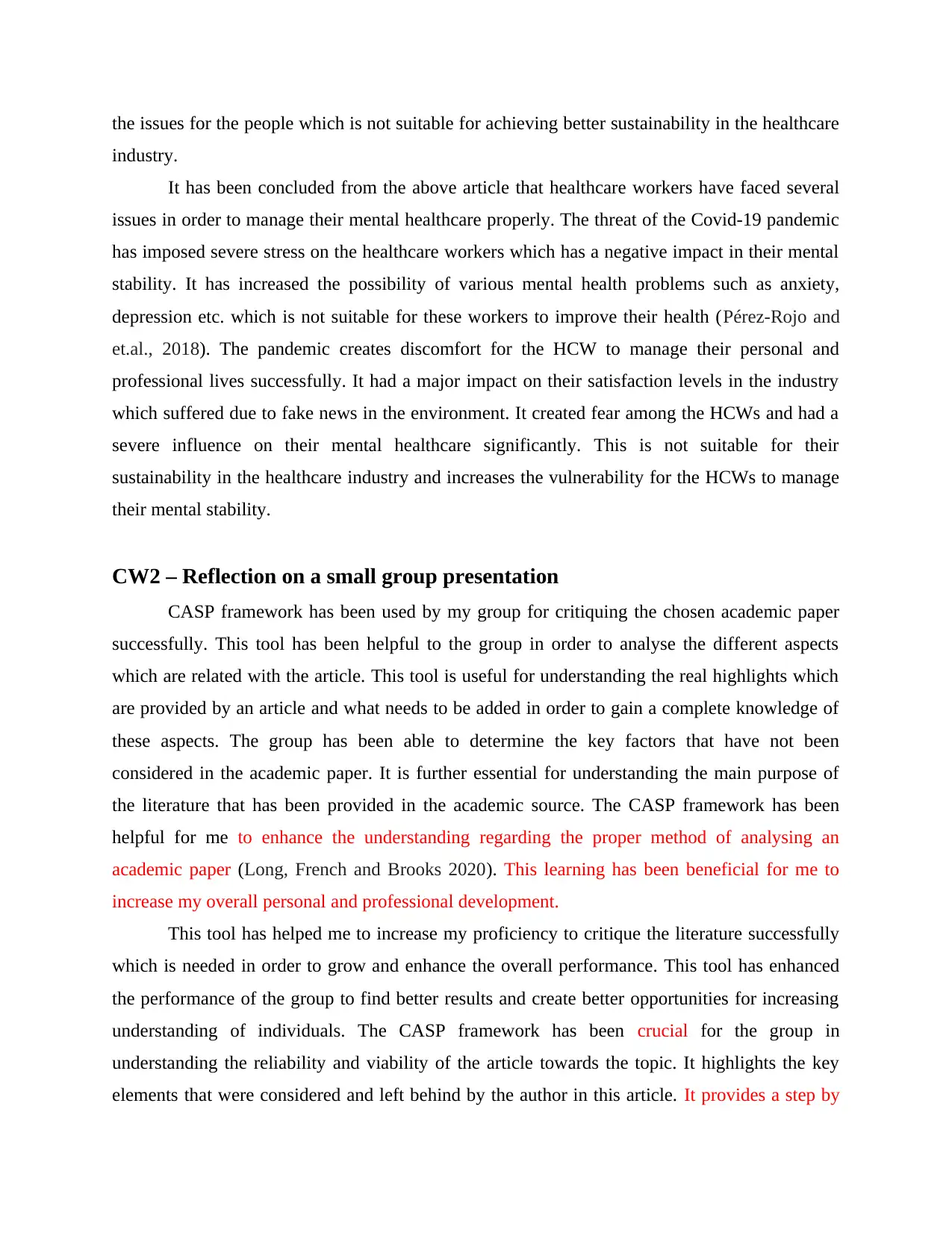
the issues for the people which is not suitable for achieving better sustainability in the healthcare
industry.
It has been concluded from the above article that healthcare workers have faced several
issues in order to manage their mental healthcare properly. The threat of the Covid-19 pandemic
has imposed severe stress on the healthcare workers which has a negative impact in their mental
stability. It has increased the possibility of various mental health problems such as anxiety,
depression etc. which is not suitable for these workers to improve their health (Pérez-Rojo and
et.al., 2018). The pandemic creates discomfort for the HCW to manage their personal and
professional lives successfully. It had a major impact on their satisfaction levels in the industry
which suffered due to fake news in the environment. It created fear among the HCWs and had a
severe influence on their mental healthcare significantly. This is not suitable for their
sustainability in the healthcare industry and increases the vulnerability for the HCWs to manage
their mental stability.
CW2 – Reflection on a small group presentation
CASP framework has been used by my group for critiquing the chosen academic paper
successfully. This tool has been helpful to the group in order to analyse the different aspects
which are related with the article. This tool is useful for understanding the real highlights which
are provided by an article and what needs to be added in order to gain a complete knowledge of
these aspects. The group has been able to determine the key factors that have not been
considered in the academic paper. It is further essential for understanding the main purpose of
the literature that has been provided in the academic source. The CASP framework has been
helpful for me to enhance the understanding regarding the proper method of analysing an
academic paper (Long, French and Brooks 2020). This learning has been beneficial for me to
increase my overall personal and professional development.
This tool has helped me to increase my proficiency to critique the literature successfully
which is needed in order to grow and enhance the overall performance. This tool has enhanced
the performance of the group to find better results and create better opportunities for increasing
understanding of individuals. The CASP framework has been crucial for the group in
understanding the reliability and viability of the article towards the topic. It highlights the key
elements that were considered and left behind by the author in this article. It provides a step by
industry.
It has been concluded from the above article that healthcare workers have faced several
issues in order to manage their mental healthcare properly. The threat of the Covid-19 pandemic
has imposed severe stress on the healthcare workers which has a negative impact in their mental
stability. It has increased the possibility of various mental health problems such as anxiety,
depression etc. which is not suitable for these workers to improve their health (Pérez-Rojo and
et.al., 2018). The pandemic creates discomfort for the HCW to manage their personal and
professional lives successfully. It had a major impact on their satisfaction levels in the industry
which suffered due to fake news in the environment. It created fear among the HCWs and had a
severe influence on their mental healthcare significantly. This is not suitable for their
sustainability in the healthcare industry and increases the vulnerability for the HCWs to manage
their mental stability.
CW2 – Reflection on a small group presentation
CASP framework has been used by my group for critiquing the chosen academic paper
successfully. This tool has been helpful to the group in order to analyse the different aspects
which are related with the article. This tool is useful for understanding the real highlights which
are provided by an article and what needs to be added in order to gain a complete knowledge of
these aspects. The group has been able to determine the key factors that have not been
considered in the academic paper. It is further essential for understanding the main purpose of
the literature that has been provided in the academic source. The CASP framework has been
helpful for me to enhance the understanding regarding the proper method of analysing an
academic paper (Long, French and Brooks 2020). This learning has been beneficial for me to
increase my overall personal and professional development.
This tool has helped me to increase my proficiency to critique the literature successfully
which is needed in order to grow and enhance the overall performance. This tool has enhanced
the performance of the group to find better results and create better opportunities for increasing
understanding of individuals. The CASP framework has been crucial for the group in
understanding the reliability and viability of the article towards the topic. It highlights the key
elements that were considered and left behind by the author in this article. It provides a step by
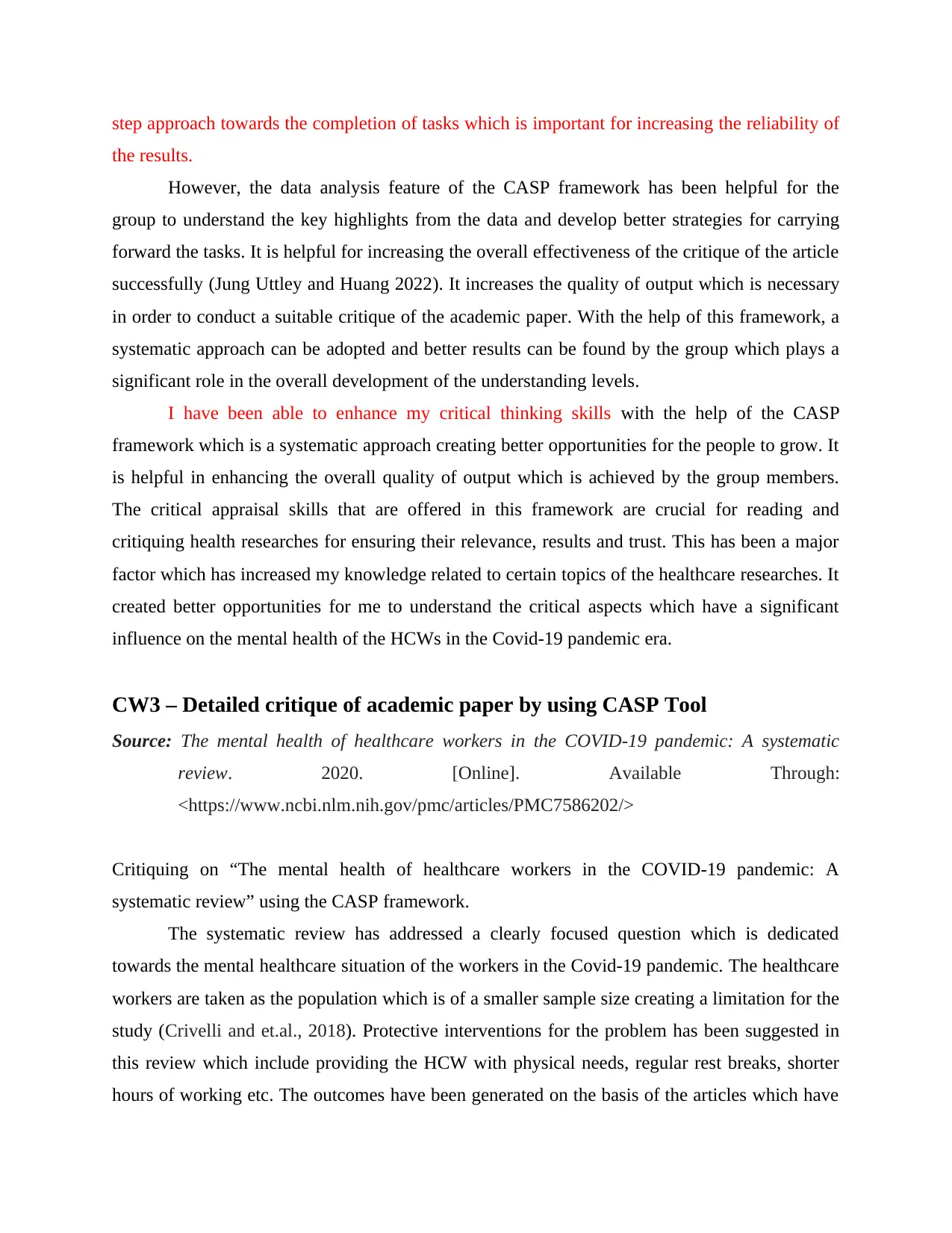
step approach towards the completion of tasks which is important for increasing the reliability of
the results.
However, the data analysis feature of the CASP framework has been helpful for the
group to understand the key highlights from the data and develop better strategies for carrying
forward the tasks. It is helpful for increasing the overall effectiveness of the critique of the article
successfully (Jung Uttley and Huang 2022). It increases the quality of output which is necessary
in order to conduct a suitable critique of the academic paper. With the help of this framework, a
systematic approach can be adopted and better results can be found by the group which plays a
significant role in the overall development of the understanding levels.
I have been able to enhance my critical thinking skills with the help of the CASP
framework which is a systematic approach creating better opportunities for the people to grow. It
is helpful in enhancing the overall quality of output which is achieved by the group members.
The critical appraisal skills that are offered in this framework are crucial for reading and
critiquing health researches for ensuring their relevance, results and trust. This has been a major
factor which has increased my knowledge related to certain topics of the healthcare researches. It
created better opportunities for me to understand the critical aspects which have a significant
influence on the mental health of the HCWs in the Covid-19 pandemic era.
CW3 – Detailed critique of academic paper by using CASP Tool
Source: The mental health of healthcare workers in the COVID-19 pandemic: A systematic
review. 2020. [Online]. Available Through:
<https://www.ncbi.nlm.nih.gov/pmc/articles/PMC7586202/>
Critiquing on “The mental health of healthcare workers in the COVID-19 pandemic: A
systematic review” using the CASP framework.
The systematic review has addressed a clearly focused question which is dedicated
towards the mental healthcare situation of the workers in the Covid-19 pandemic. The healthcare
workers are taken as the population which is of a smaller sample size creating a limitation for the
study (Crivelli and et.al., 2018). Protective interventions for the problem has been suggested in
this review which include providing the HCW with physical needs, regular rest breaks, shorter
hours of working etc. The outcomes have been generated on the basis of the articles which have
the results.
However, the data analysis feature of the CASP framework has been helpful for the
group to understand the key highlights from the data and develop better strategies for carrying
forward the tasks. It is helpful for increasing the overall effectiveness of the critique of the article
successfully (Jung Uttley and Huang 2022). It increases the quality of output which is necessary
in order to conduct a suitable critique of the academic paper. With the help of this framework, a
systematic approach can be adopted and better results can be found by the group which plays a
significant role in the overall development of the understanding levels.
I have been able to enhance my critical thinking skills with the help of the CASP
framework which is a systematic approach creating better opportunities for the people to grow. It
is helpful in enhancing the overall quality of output which is achieved by the group members.
The critical appraisal skills that are offered in this framework are crucial for reading and
critiquing health researches for ensuring their relevance, results and trust. This has been a major
factor which has increased my knowledge related to certain topics of the healthcare researches. It
created better opportunities for me to understand the critical aspects which have a significant
influence on the mental health of the HCWs in the Covid-19 pandemic era.
CW3 – Detailed critique of academic paper by using CASP Tool
Source: The mental health of healthcare workers in the COVID-19 pandemic: A systematic
review. 2020. [Online]. Available Through:
<https://www.ncbi.nlm.nih.gov/pmc/articles/PMC7586202/>
Critiquing on “The mental health of healthcare workers in the COVID-19 pandemic: A
systematic review” using the CASP framework.
The systematic review has addressed a clearly focused question which is dedicated
towards the mental healthcare situation of the workers in the Covid-19 pandemic. The healthcare
workers are taken as the population which is of a smaller sample size creating a limitation for the
study (Crivelli and et.al., 2018). Protective interventions for the problem has been suggested in
this review which include providing the HCW with physical needs, regular rest breaks, shorter
hours of working etc. The outcomes have been generated on the basis of the articles which have
⊘ This is a preview!⊘
Do you want full access?
Subscribe today to unlock all pages.

Trusted by 1+ million students worldwide
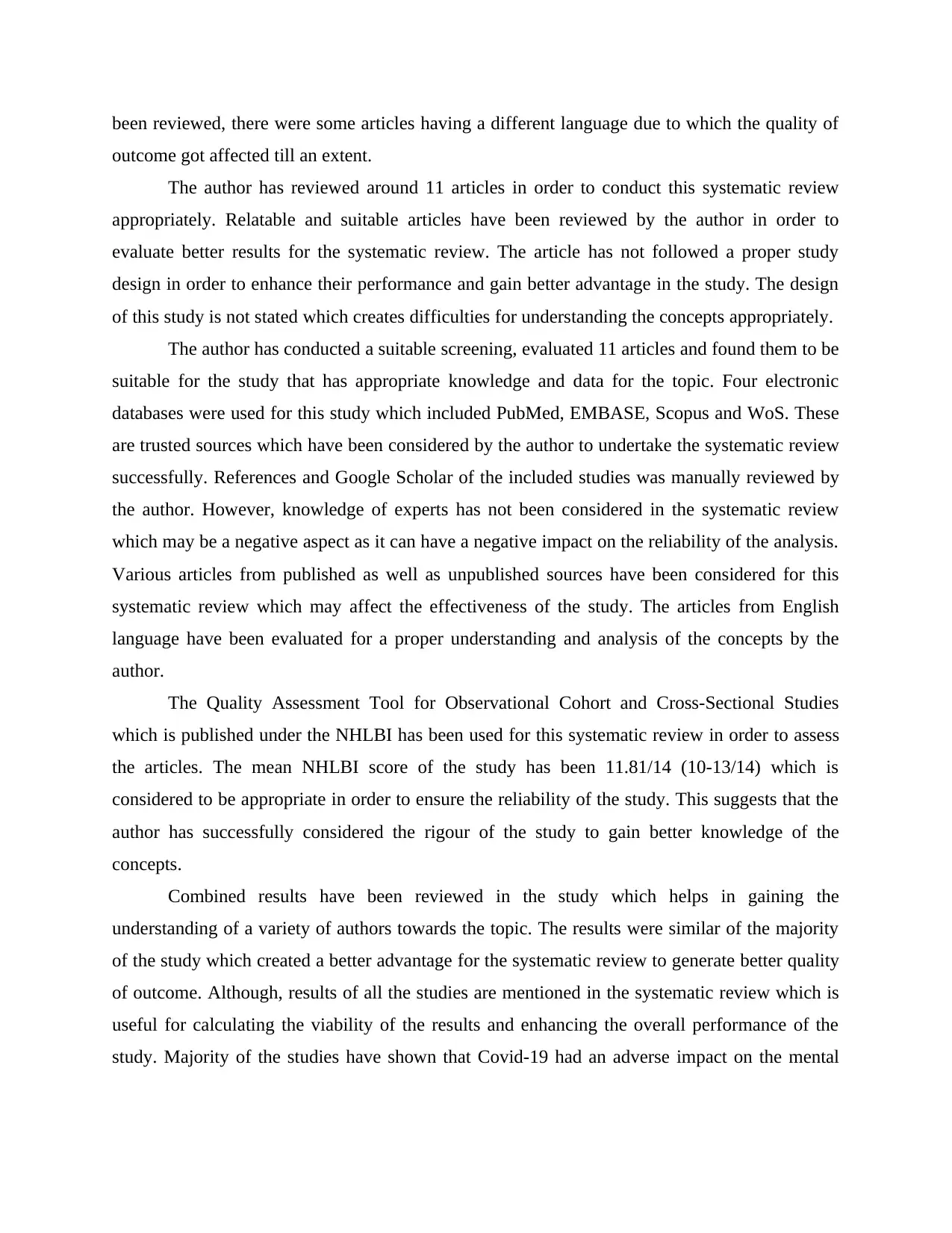
been reviewed, there were some articles having a different language due to which the quality of
outcome got affected till an extent.
The author has reviewed around 11 articles in order to conduct this systematic review
appropriately. Relatable and suitable articles have been reviewed by the author in order to
evaluate better results for the systematic review. The article has not followed a proper study
design in order to enhance their performance and gain better advantage in the study. The design
of this study is not stated which creates difficulties for understanding the concepts appropriately.
The author has conducted a suitable screening, evaluated 11 articles and found them to be
suitable for the study that has appropriate knowledge and data for the topic. Four electronic
databases were used for this study which included PubMed, EMBASE, Scopus and WoS. These
are trusted sources which have been considered by the author to undertake the systematic review
successfully. References and Google Scholar of the included studies was manually reviewed by
the author. However, knowledge of experts has not been considered in the systematic review
which may be a negative aspect as it can have a negative impact on the reliability of the analysis.
Various articles from published as well as unpublished sources have been considered for this
systematic review which may affect the effectiveness of the study. The articles from English
language have been evaluated for a proper understanding and analysis of the concepts by the
author.
The Quality Assessment Tool for Observational Cohort and Cross-Sectional Studies
which is published under the NHLBI has been used for this systematic review in order to assess
the articles. The mean NHLBI score of the study has been 11.81/14 (10-13/14) which is
considered to be appropriate in order to ensure the reliability of the study. This suggests that the
author has successfully considered the rigour of the study to gain better knowledge of the
concepts.
Combined results have been reviewed in the study which helps in gaining the
understanding of a variety of authors towards the topic. The results were similar of the majority
of the study which created a better advantage for the systematic review to generate better quality
of outcome. Although, results of all the studies are mentioned in the systematic review which is
useful for calculating the viability of the results and enhancing the overall performance of the
study. Majority of the studies have shown that Covid-19 had an adverse impact on the mental
outcome got affected till an extent.
The author has reviewed around 11 articles in order to conduct this systematic review
appropriately. Relatable and suitable articles have been reviewed by the author in order to
evaluate better results for the systematic review. The article has not followed a proper study
design in order to enhance their performance and gain better advantage in the study. The design
of this study is not stated which creates difficulties for understanding the concepts appropriately.
The author has conducted a suitable screening, evaluated 11 articles and found them to be
suitable for the study that has appropriate knowledge and data for the topic. Four electronic
databases were used for this study which included PubMed, EMBASE, Scopus and WoS. These
are trusted sources which have been considered by the author to undertake the systematic review
successfully. References and Google Scholar of the included studies was manually reviewed by
the author. However, knowledge of experts has not been considered in the systematic review
which may be a negative aspect as it can have a negative impact on the reliability of the analysis.
Various articles from published as well as unpublished sources have been considered for this
systematic review which may affect the effectiveness of the study. The articles from English
language have been evaluated for a proper understanding and analysis of the concepts by the
author.
The Quality Assessment Tool for Observational Cohort and Cross-Sectional Studies
which is published under the NHLBI has been used for this systematic review in order to assess
the articles. The mean NHLBI score of the study has been 11.81/14 (10-13/14) which is
considered to be appropriate in order to ensure the reliability of the study. This suggests that the
author has successfully considered the rigour of the study to gain better knowledge of the
concepts.
Combined results have been reviewed in the study which helps in gaining the
understanding of a variety of authors towards the topic. The results were similar of the majority
of the study which created a better advantage for the systematic review to generate better quality
of outcome. Although, results of all the studies are mentioned in the systematic review which is
useful for calculating the viability of the results and enhancing the overall performance of the
study. Majority of the studies have shown that Covid-19 had an adverse impact on the mental
Paraphrase This Document
Need a fresh take? Get an instant paraphrase of this document with our AI Paraphraser
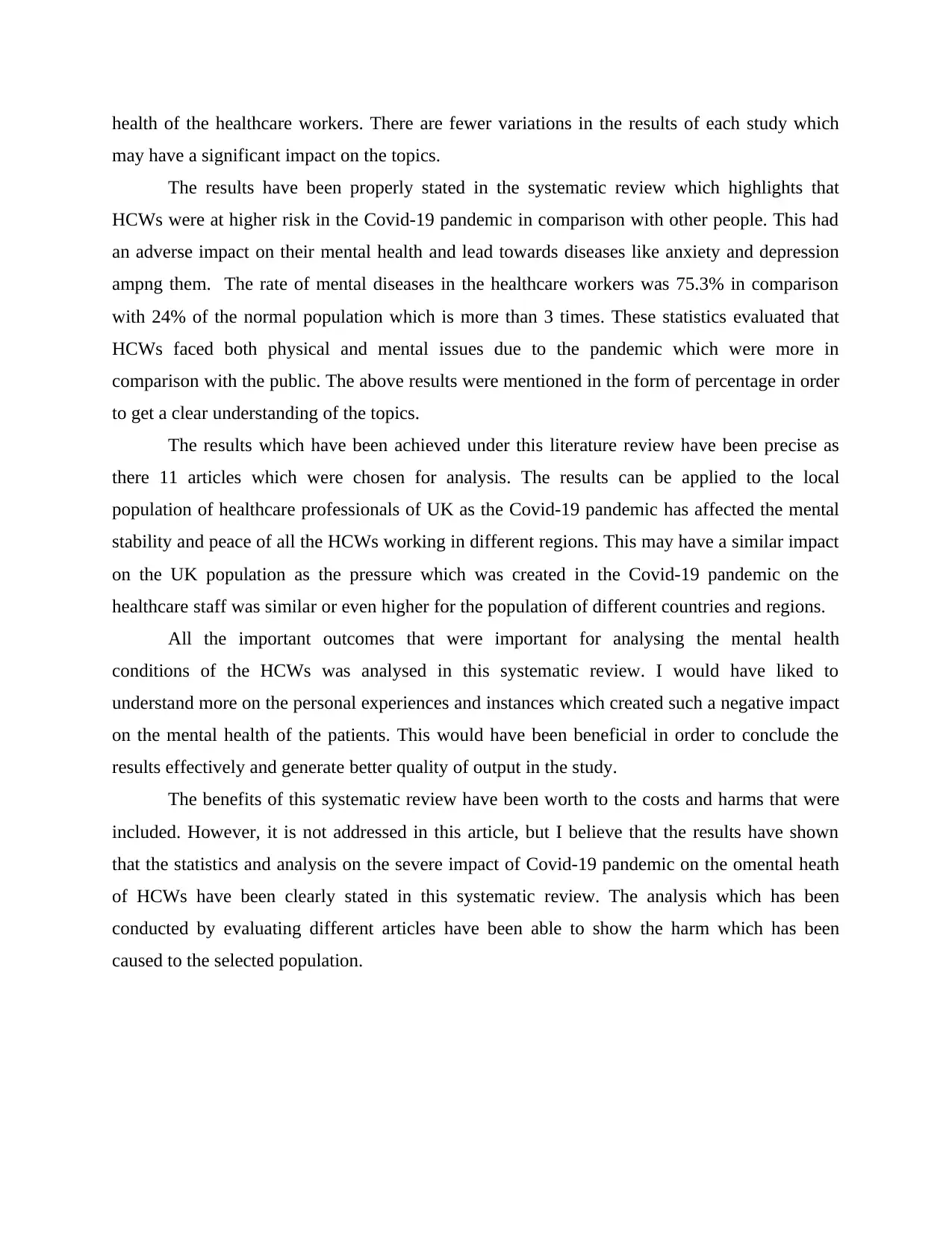
health of the healthcare workers. There are fewer variations in the results of each study which
may have a significant impact on the topics.
The results have been properly stated in the systematic review which highlights that
HCWs were at higher risk in the Covid-19 pandemic in comparison with other people. This had
an adverse impact on their mental health and lead towards diseases like anxiety and depression
ampng them. The rate of mental diseases in the healthcare workers was 75.3% in comparison
with 24% of the normal population which is more than 3 times. These statistics evaluated that
HCWs faced both physical and mental issues due to the pandemic which were more in
comparison with the public. The above results were mentioned in the form of percentage in order
to get a clear understanding of the topics.
The results which have been achieved under this literature review have been precise as
there 11 articles which were chosen for analysis. The results can be applied to the local
population of healthcare professionals of UK as the Covid-19 pandemic has affected the mental
stability and peace of all the HCWs working in different regions. This may have a similar impact
on the UK population as the pressure which was created in the Covid-19 pandemic on the
healthcare staff was similar or even higher for the population of different countries and regions.
All the important outcomes that were important for analysing the mental health
conditions of the HCWs was analysed in this systematic review. I would have liked to
understand more on the personal experiences and instances which created such a negative impact
on the mental health of the patients. This would have been beneficial in order to conclude the
results effectively and generate better quality of output in the study.
The benefits of this systematic review have been worth to the costs and harms that were
included. However, it is not addressed in this article, but I believe that the results have shown
that the statistics and analysis on the severe impact of Covid-19 pandemic on the omental heath
of HCWs have been clearly stated in this systematic review. The analysis which has been
conducted by evaluating different articles have been able to show the harm which has been
caused to the selected population.
may have a significant impact on the topics.
The results have been properly stated in the systematic review which highlights that
HCWs were at higher risk in the Covid-19 pandemic in comparison with other people. This had
an adverse impact on their mental health and lead towards diseases like anxiety and depression
ampng them. The rate of mental diseases in the healthcare workers was 75.3% in comparison
with 24% of the normal population which is more than 3 times. These statistics evaluated that
HCWs faced both physical and mental issues due to the pandemic which were more in
comparison with the public. The above results were mentioned in the form of percentage in order
to get a clear understanding of the topics.
The results which have been achieved under this literature review have been precise as
there 11 articles which were chosen for analysis. The results can be applied to the local
population of healthcare professionals of UK as the Covid-19 pandemic has affected the mental
stability and peace of all the HCWs working in different regions. This may have a similar impact
on the UK population as the pressure which was created in the Covid-19 pandemic on the
healthcare staff was similar or even higher for the population of different countries and regions.
All the important outcomes that were important for analysing the mental health
conditions of the HCWs was analysed in this systematic review. I would have liked to
understand more on the personal experiences and instances which created such a negative impact
on the mental health of the patients. This would have been beneficial in order to conclude the
results effectively and generate better quality of output in the study.
The benefits of this systematic review have been worth to the costs and harms that were
included. However, it is not addressed in this article, but I believe that the results have shown
that the statistics and analysis on the severe impact of Covid-19 pandemic on the omental heath
of HCWs have been clearly stated in this systematic review. The analysis which has been
conducted by evaluating different articles have been able to show the harm which has been
caused to the selected population.
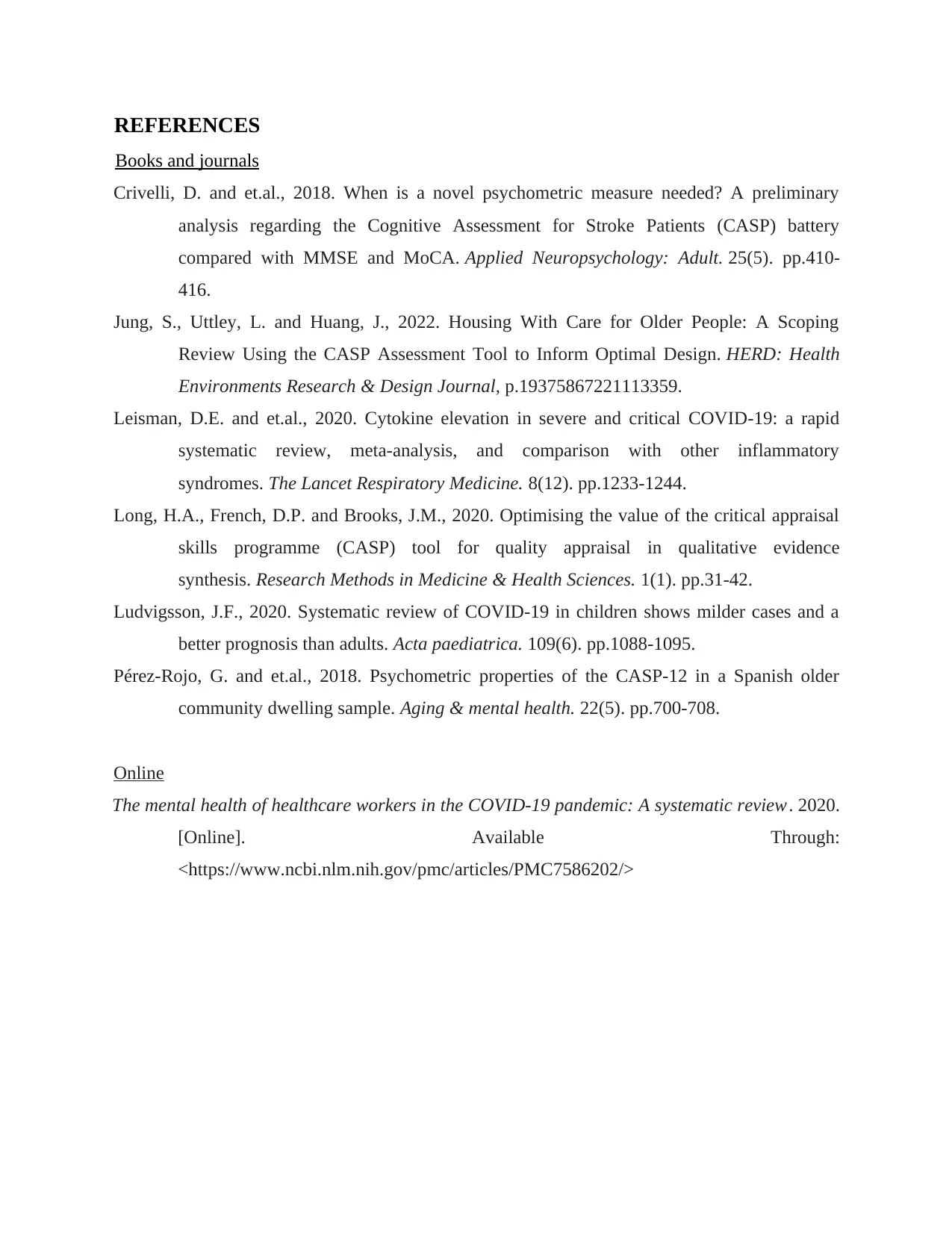
REFERENCES
Books and journals
Crivelli, D. and et.al., 2018. When is a novel psychometric measure needed? A preliminary
analysis regarding the Cognitive Assessment for Stroke Patients (CASP) battery
compared with MMSE and MoCA. Applied Neuropsychology: Adult. 25(5). pp.410-
416.
Jung, S., Uttley, L. and Huang, J., 2022. Housing With Care for Older People: A Scoping
Review Using the CASP Assessment Tool to Inform Optimal Design. HERD: Health
Environments Research & Design Journal, p.19375867221113359.
Leisman, D.E. and et.al., 2020. Cytokine elevation in severe and critical COVID-19: a rapid
systematic review, meta-analysis, and comparison with other inflammatory
syndromes. The Lancet Respiratory Medicine. 8(12). pp.1233-1244.
Long, H.A., French, D.P. and Brooks, J.M., 2020. Optimising the value of the critical appraisal
skills programme (CASP) tool for quality appraisal in qualitative evidence
synthesis. Research Methods in Medicine & Health Sciences. 1(1). pp.31-42.
Ludvigsson, J.F., 2020. Systematic review of COVID‐19 in children shows milder cases and a
better prognosis than adults. Acta paediatrica. 109(6). pp.1088-1095.
Pérez-Rojo, G. and et.al., 2018. Psychometric properties of the CASP-12 in a Spanish older
community dwelling sample. Aging & mental health. 22(5). pp.700-708.
Online
The mental health of healthcare workers in the COVID-19 pandemic: A systematic review. 2020.
[Online]. Available Through:
<https://www.ncbi.nlm.nih.gov/pmc/articles/PMC7586202/>
Books and journals
Crivelli, D. and et.al., 2018. When is a novel psychometric measure needed? A preliminary
analysis regarding the Cognitive Assessment for Stroke Patients (CASP) battery
compared with MMSE and MoCA. Applied Neuropsychology: Adult. 25(5). pp.410-
416.
Jung, S., Uttley, L. and Huang, J., 2022. Housing With Care for Older People: A Scoping
Review Using the CASP Assessment Tool to Inform Optimal Design. HERD: Health
Environments Research & Design Journal, p.19375867221113359.
Leisman, D.E. and et.al., 2020. Cytokine elevation in severe and critical COVID-19: a rapid
systematic review, meta-analysis, and comparison with other inflammatory
syndromes. The Lancet Respiratory Medicine. 8(12). pp.1233-1244.
Long, H.A., French, D.P. and Brooks, J.M., 2020. Optimising the value of the critical appraisal
skills programme (CASP) tool for quality appraisal in qualitative evidence
synthesis. Research Methods in Medicine & Health Sciences. 1(1). pp.31-42.
Ludvigsson, J.F., 2020. Systematic review of COVID‐19 in children shows milder cases and a
better prognosis than adults. Acta paediatrica. 109(6). pp.1088-1095.
Pérez-Rojo, G. and et.al., 2018. Psychometric properties of the CASP-12 in a Spanish older
community dwelling sample. Aging & mental health. 22(5). pp.700-708.
Online
The mental health of healthcare workers in the COVID-19 pandemic: A systematic review. 2020.
[Online]. Available Through:
<https://www.ncbi.nlm.nih.gov/pmc/articles/PMC7586202/>
⊘ This is a preview!⊘
Do you want full access?
Subscribe today to unlock all pages.

Trusted by 1+ million students worldwide
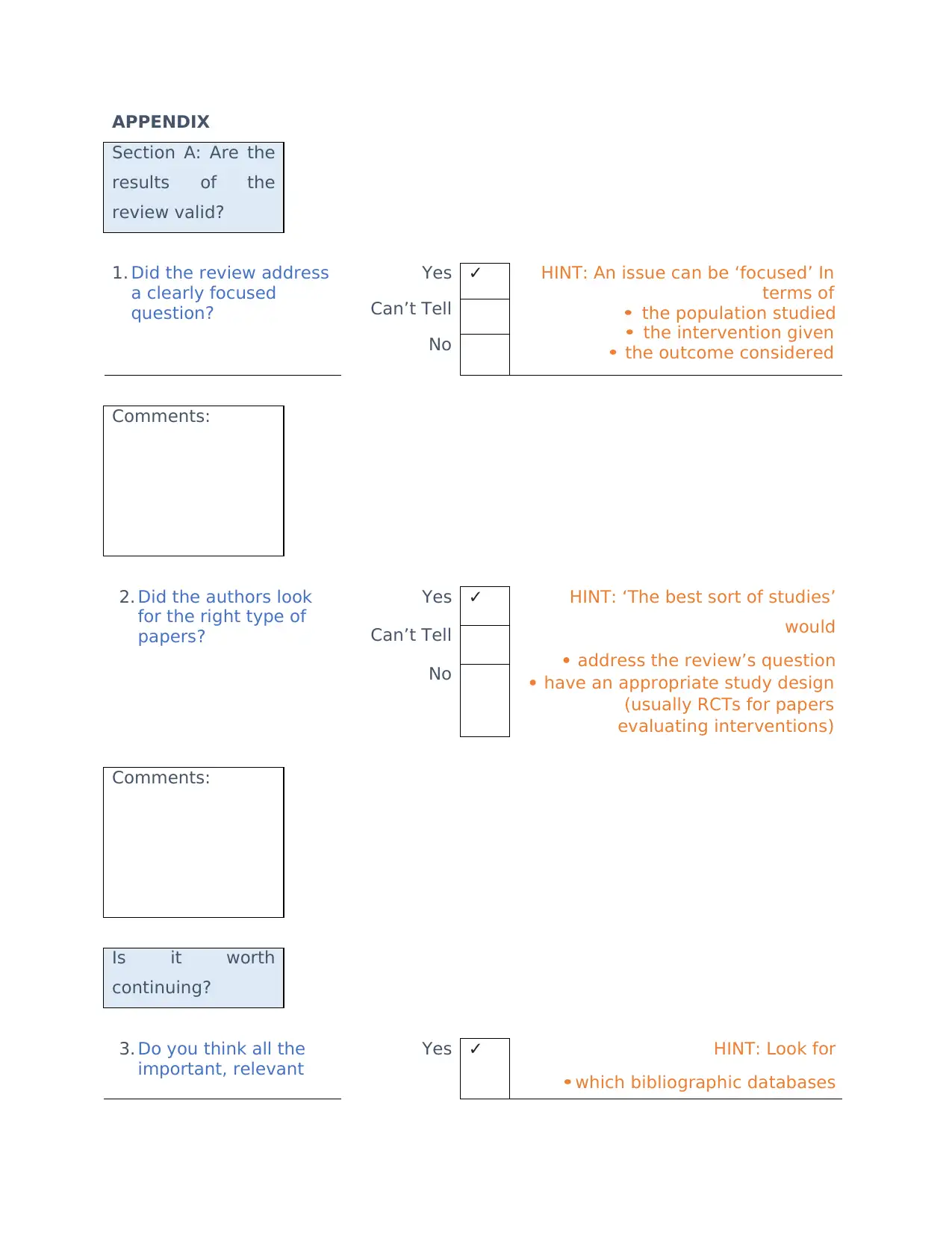
APPENDIX
Section A: Are the
results of the
review valid?
1. Did the review address
a clearly focused
question?
Yes ✓ HINT: An issue can be ‘focused’ In
terms of
• the population studied
• the intervention given
• the outcome considered
Can’t Tell
No
Comments:
2. Did the authors look
for the right type of
papers?
Yes ✓ HINT: ‘The best sort of studies’
would
address the review’s question
have an appropriate study design
(usually RCTs for papers
evaluating interventions)
Can’t Tell
No
Comments:
Is it worth
continuing?
3. Do you think all the
important, relevant
Yes ✓ HINT: Look for
•which bibliographic databases
Section A: Are the
results of the
review valid?
1. Did the review address
a clearly focused
question?
Yes ✓ HINT: An issue can be ‘focused’ In
terms of
• the population studied
• the intervention given
• the outcome considered
Can’t Tell
No
Comments:
2. Did the authors look
for the right type of
papers?
Yes ✓ HINT: ‘The best sort of studies’
would
address the review’s question
have an appropriate study design
(usually RCTs for papers
evaluating interventions)
Can’t Tell
No
Comments:
Is it worth
continuing?
3. Do you think all the
important, relevant
Yes ✓ HINT: Look for
•which bibliographic databases
Paraphrase This Document
Need a fresh take? Get an instant paraphrase of this document with our AI Paraphraser
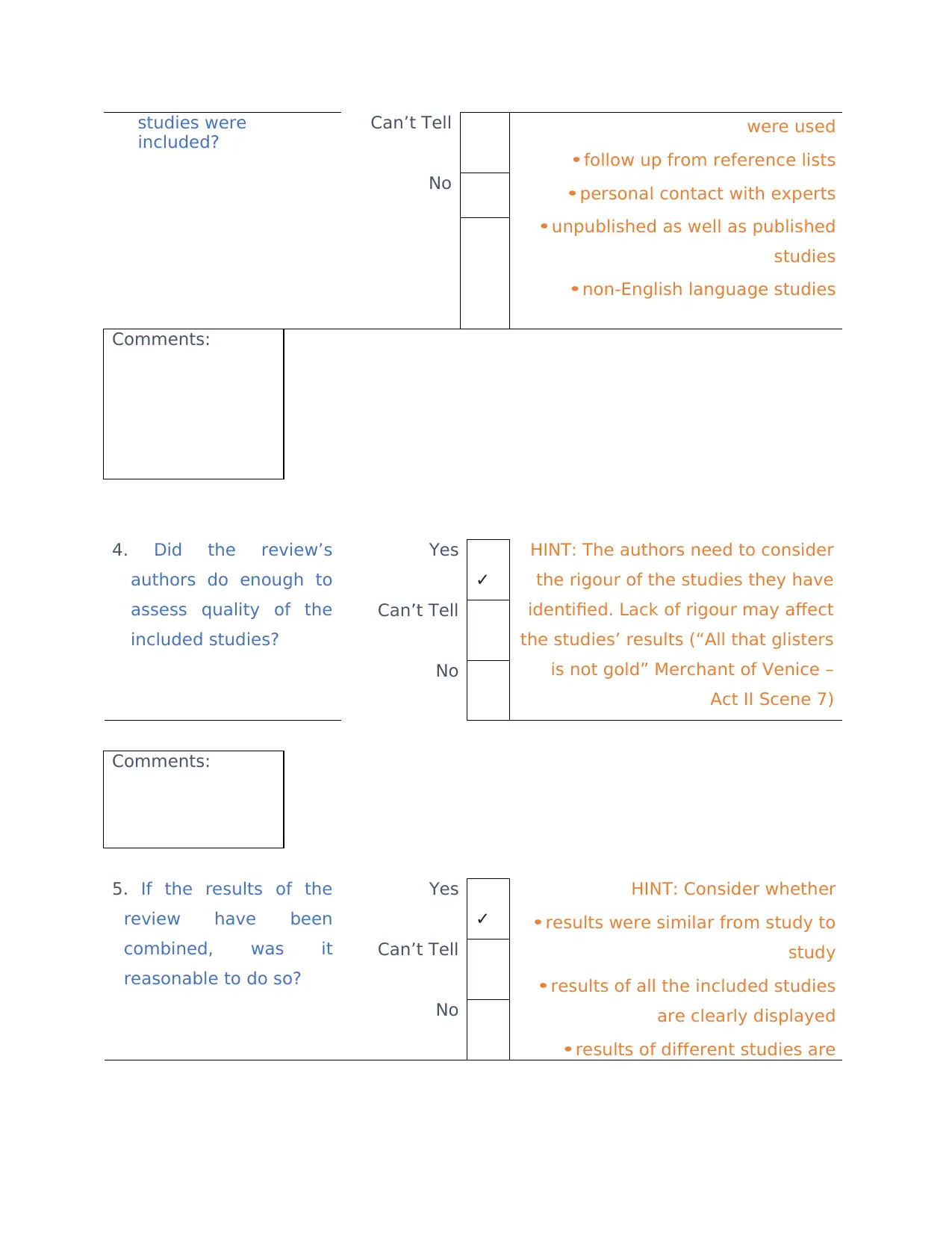
studies were
included? were used
•follow up from reference lists
•personal contact with experts
•unpublished as well as published
studies
•non-English language studies
Can’t Tell
No
Comments:
4. Did the review’s
authors do enough to
assess quality of the
included studies?
Yes
✓
HINT: The authors need to consider
the rigour of the studies they have
identified. Lack of rigour may affect
the studies’ results (“All that glisters
is not gold” Merchant of Venice –
Act II Scene 7)
Can’t Tell
No
Comments:
5. If the results of the
review have been
combined, was it
reasonable to do so?
Yes
✓
HINT: Consider whether
•results were similar from study to
study
•results of all the included studies
are clearly displayed
•results of different studies are
Can’t Tell
No
included? were used
•follow up from reference lists
•personal contact with experts
•unpublished as well as published
studies
•non-English language studies
Can’t Tell
No
Comments:
4. Did the review’s
authors do enough to
assess quality of the
included studies?
Yes
✓
HINT: The authors need to consider
the rigour of the studies they have
identified. Lack of rigour may affect
the studies’ results (“All that glisters
is not gold” Merchant of Venice –
Act II Scene 7)
Can’t Tell
No
Comments:
5. If the results of the
review have been
combined, was it
reasonable to do so?
Yes
✓
HINT: Consider whether
•results were similar from study to
study
•results of all the included studies
are clearly displayed
•results of different studies are
Can’t Tell
No
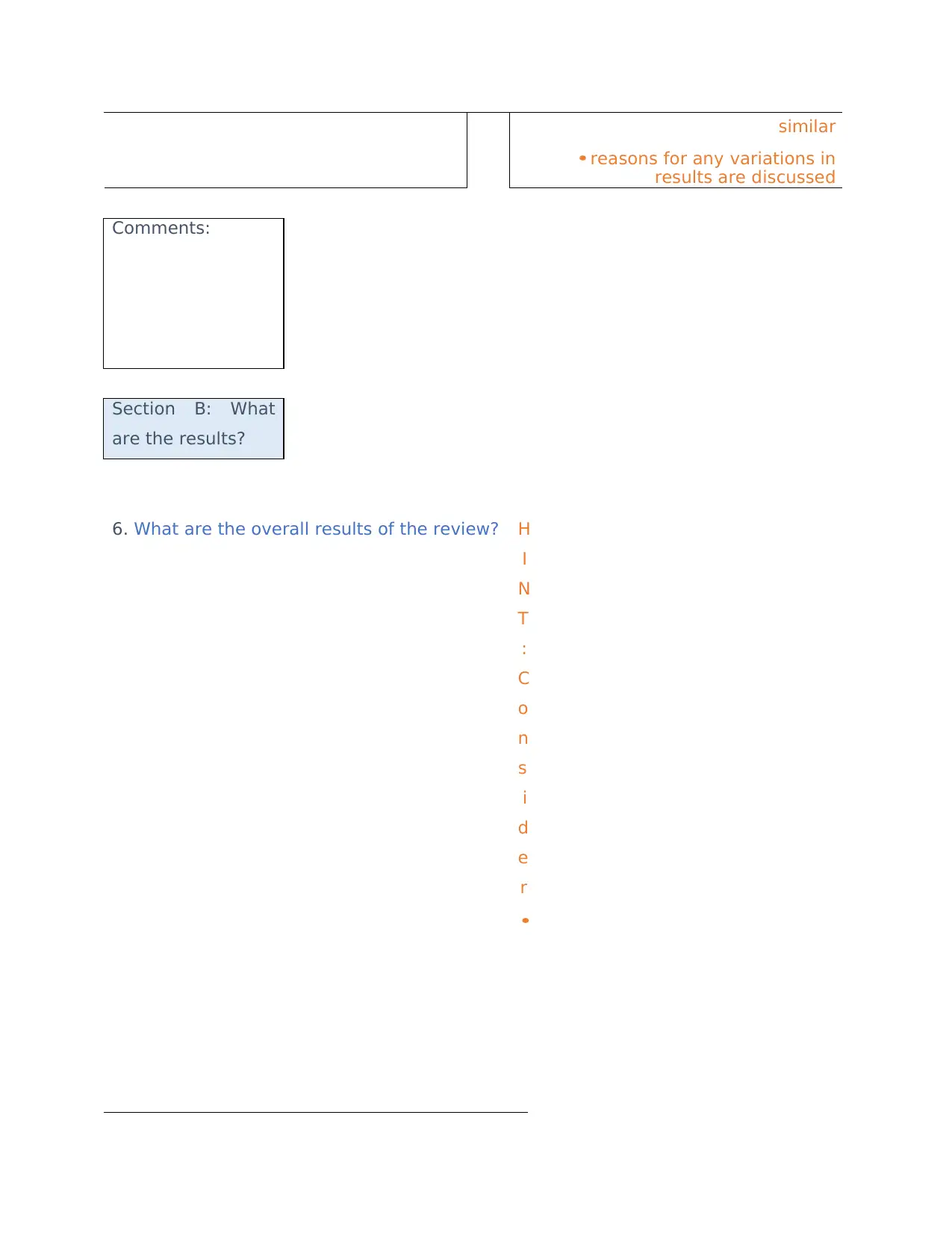
similar
•reasons for any variations in
results are discussed
Comments:
Section B: What
are the results?
6. What are the overall results of the review? H
I
N
T
:
C
o
n
s
i
d
e
r
•
•reasons for any variations in
results are discussed
Comments:
Section B: What
are the results?
6. What are the overall results of the review? H
I
N
T
:
C
o
n
s
i
d
e
r
•
⊘ This is a preview!⊘
Do you want full access?
Subscribe today to unlock all pages.

Trusted by 1+ million students worldwide
1 out of 19
Related Documents
Your All-in-One AI-Powered Toolkit for Academic Success.
+13062052269
info@desklib.com
Available 24*7 on WhatsApp / Email
![[object Object]](/_next/static/media/star-bottom.7253800d.svg)
Unlock your academic potential
Copyright © 2020–2026 A2Z Services. All Rights Reserved. Developed and managed by ZUCOL.




